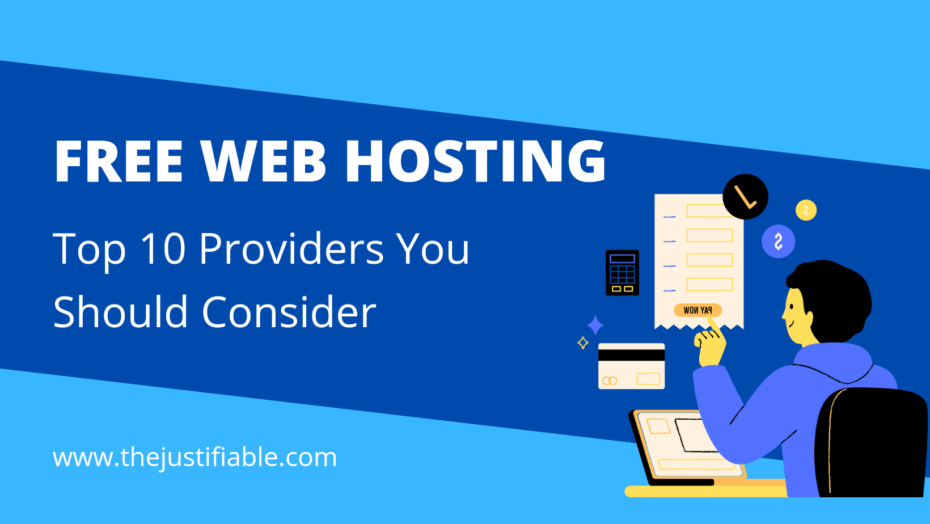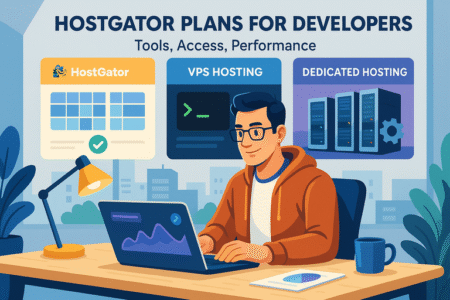Table of Contents
In today’s digital era, having a website has become a necessity for many – be it businesses, individuals, or organizations. While many options are available for setting up your web presence, free web hosting stands out as an attractive choice for those just starting out or operating on tight budgets.
At its core, free web hosting offers users the platform and tools they need to get a website live without incurring any immediate costs.
The Rise of Free Web Hosting Solutions
The Internet has been a game-changer in democratizing information and bringing people closer than ever before. As more individuals and businesses saw the potential of having an online presence, there was a surge in demand for affordable web hosting solutions. Enter free web hosting providers.
In the early days, free hosting was seen as a rudimentary service, often accompanied by ads placed by the hosting provider and limited in terms of features. But as technology advanced and competition increased, providers began to offer more robust solutions. They realized that by providing a free service, they could attract users who might later upgrade to paid plans as their needs grew.
This freemium model played a pivotal role in the rise of free web hosting solutions, allowing users to test the waters without financial risk and giving providers a foot in the door for potential upselling.
Benefits of Opting for Free Web Hosting
Choosing free web hosting comes with a myriad of advantages, especially for newcomers:
- Cost-Effective: The most apparent benefit is the lack of financial commitment. For start-ups, hobbyists, or those on a tight budget, this can be a game-changer, allowing for online experimentation without incurring costs.
- Learning Opportunity: Free hosting platforms often come with built-in tools and tutorials, providing a great environment for beginners to learn about web development and site management.
- No Long-Term Commitments: With free web hosting, you aren’t tied down with long-term contracts. This flexibility can be crucial for those uncertain about their long-term online strategies.
- Trial Before Upgrade: If you’re considering a paid plan but aren’t sure of the provider, starting with their free offering can give you a firsthand experience of their services and support.
However, while free web hosting offers numerous perks, it’s essential to balance these benefits with potential limitations, such as restricted bandwidth, storage, or lack of certain functionalities. These considerations will play a crucial role in determining if free web hosting is the right solution for your needs.
What to Look for in a Free Web Hosting Provider
Navigating the diverse landscape of free web hosting can be quite daunting for newcomers. Amidst the myriad of options available, it becomes crucial to discern which providers offer genuine value, and which might lead to more headaches than they’re worth.
Understanding the elements that constitute a trustworthy free hosting provider can be your compass in this journey.
Key Features and Limitations
When evaluating free web hosting providers, it’s imperative to first lay out the essentials. What tools and capabilities does the hosting provider offer right off the bat? Perhaps they provide an integrated website builder, one-click installations for popular platforms, or even access to a control panel.
While these features can enhance the user experience and streamline website management, it’s equally important to be wary of the accompanying limitations.
Many free hosting providers offset their costs by placing ads on user websites. This can detract from the professionalism of a site and become a potential deterrent for visitors. Additionally, storage and bandwidth limits are common in free hosting offers.
While they may seem generous at first, growing websites can quickly run into these barriers, affecting their performance and scalability. Recognizing and weighing these features against the inherent restrictions will play a pivotal role in making an informed choice.
Security Measures and Concerns
One of the often-overlooked aspects of free web hosting is security. With the rise in cyber threats, ensuring that your website is secure becomes paramount. When considering a free provider, delve into the security measures they have in place. Do they offer SSL certificates, even on their free plans? What about protection against DDoS attacks or regular backups?
However, it’s not just about what’s being offered; it’s also about the inherent risks. Free hosting platforms, by virtue of being free, can sometimes attract malicious activities. If the hosting provider doesn’t enforce stringent security protocols, there’s a risk of your site getting compromised or even blacklisted. Being vigilant about security is non-negotiable, even when the services come without a price tag.
Uptime Guarantees and Realities
Every minute your website is down, you could be losing potential clients, readers, or reputation. Uptime – the measure of a website’s operational performance and reliability – is thus a critical factor when choosing any hosting, including free web hosting. Many providers tout impressive uptime guarantees, often in the high 99% range. But as the adage goes, “actions speak louder than words.”
Before committing to a provider, it’s wise to seek out third-party reviews or monitor the uptime statistics over a period. Just because a service is free doesn’t mean you should compromise on the accessibility of your website. Remember, in the digital realm, reliability can significantly impact how your audience perceives you.
The Top 10 Free Web Hosting Providers
The realm of free web hosting has seen exponential growth in recent years, with a plethora of options springing forth to cater to diverse needs.
Amidst this growth, several providers have risen above the rest, not merely for the zero cost but for the value and capabilities they bring to the table. In this segment, we delve into two of the leading names that have cemented their reputation in the free hosting space.
1. Wix: User-Friendly Drag and Drop
In the world of website builders, Wix has carved out a distinct identity, chiefly owing to its intuitive and user-friendly drag-and-drop interface. For those stepping into the digital sphere without a background in coding or web design, Wix’s free web hosting option offers a gateway to a professional online presence.
But Wix isn’t just about simplicity; it’s about customization and versatility. The platform boasts a vast library of templates catering to various industries and personal preferences. Whether you’re a photographer aiming to showcase your portfolio or a local cafe seeking to expand its customer base, Wix has a design blueprint ready for you.
Moreover, the Wix ADI (Artificial Design Intelligence) can craft a unique website based on a series of questions, ensuring every user gets a bespoke online space. And while the free plan does come with Wix-branded ads, the overall package — considering the ease of use, aesthetics, and reliability — makes it a top contender in the free web hosting landscape.
2. WordPress.com: Best for Bloggers
WordPress.com, not to be confused with its self-hosted counterpart WordPress.org, has long been the go-to platform for bloggers worldwide. Its rise to prominence in the free web hosting sector is a testament to its adaptability, powerful features, and vibrant community.
The platform is particularly renowned for its blogging tools. From seamless content creation to in-depth analytics, WordPress.com equips bloggers with everything they need to share their stories, connect with their audience, and even monetize their passion. The vast array of plugins and themes ensures that each blog can have a distinct feel and functionality.
While the free version does come with WordPress branding and doesn’t allow for a custom domain, it’s the perfect starting point for writers and creators. As they grow, users can easily transition to one of the paid plans, unlocking additional features and greater customization. In the blogging realm, few can rival the holistic experience that WordPress.com provides.
3. Weebly: Simple Site Building
Navigating the maze of website creation can often seem overwhelming, especially for those taking their first steps into the digital realm. Weebly emerges as a beacon of simplicity amidst this complexity. Recognized predominantly for its straightforward design tools, Weebly’s platform has empowered millions to bring their visions to life online without getting entangled in the intricacies of coding or design.
One of the most commendable facets of Weebly is its commitment to user-friendliness without sacrificing professionalism. Their drag-and-drop editor is intuitively structured, allowing users to seamlessly integrate various elements, from images to contact forms. Furthermore, every Weebly-created site is mobile-responsive, ensuring a consistent browsing experience across devices.
On the free web hosting side, Weebly offers a generous package, albeit with some branding. Yet, the platform’s ease of use, combined with its comprehensive range of design tools, solidifies its spot as a top choice for those aiming for a hassle-free website creation journey.
4. 000WebHost: Zero-Cost Hosting with PHP & MySQL
In the realm of free hosting, 000WebHost stands out, not just for its price point (or lack thereof) but for the sheer depth of its offerings. For web enthusiasts and developers looking for a platform that supports PHP & MySQL without burning a hole in their pockets, 000WebHost is a veritable treasure trove.
Beyond just the technical capabilities, 000WebHost has garnered acclaim for its commitment to uptime and speed. In an industry where free often comes with hidden compromises, this provider defies the norm. Additionally, the platform’s user panel is modern, feature-rich, and surprisingly beginner-friendly, making website management a breeze.
Yet, as with all free services, there’s a balancing act. While 000WebHost does offer a robust suite of tools, users might occasionally encounter ads. However, for those seeking a zero-cost hosting solution with a slant towards technical flexibility, 000WebHost emerges as a front-runner.
5. AwardSpace: Reliable and Feature-Rich
Diving into the world of free web hosting often means being prepared for a sea of limitations. Yet, every once in a while, platforms like AwardSpace challenge this status quo. With a legacy rooted in reliability and a spectrum of features that rival even some paid hosting providers, AwardSpace has secured its position as a favorite among the web community.
What sets AwardSpace apart is its holistic approach to hosting. From a user-friendly control panel to support for popular CMS platforms, the service ensures that both novices and seasoned webmasters feel at home. Security, too, is at the forefront, with measures in place to ensure that websites remain safeguarded against potential threats.
Of course, as a free service, there are boundaries. Bandwidth and storage aren’t limitless, but they’re often more than sufficient for personal projects or small businesses just starting out. In the landscape of free hosting, AwardSpace stands as a testament to the fact that free doesn’t have to mean compromising on quality.
6. InfinityFree: Unlimited Space and Bandwidth
In the vast universe of free web hosting, InfinityFree makes a bold statement with its promise: unlimited space and bandwidth. For many website owners, especially those with growing needs, this offer is nothing short of a dream. But it’s not just the grand promises that make InfinityFree stand out; it’s their dedication to fulfilling them.
With InfinityFree, users are introduced to a realm where the typical constraints of free hosting – limited storage and restrictive bandwidth caps – simply don’t apply. This is particularly invaluable for sites with rich media or those anticipating high traffic surges.
The platform ensures that, regardless of how expansive a website’s content library becomes or how large its audience grows, it remains steadfastly supported.
Of course, ‘unlimited’ in the world of hosting often comes with its nuances. While InfinityFree genuinely offers expansive resources, it’s crucial for users to understand and abide by their fair usage policies. Nevertheless, for those on the hunt for a hosting solution that breaks the chains of limitation, InfinityFree stands as a beacon.
7. Site123: Easy Setup with Ready-Made Styles
Embarking on the website creation journey can be a daunting endeavor for many, especially those without a technical background. Site123 emerges as a reassuring ally in this journey, priding itself on simplifying the website-building process. With its free web hosting offering, Site123 delivers a blend of simplicity and style that resonates with a broad user base.
The platform’s strength lies in its intuitive website builder, which streamlines the design process with a range of ready-made styles. Whether it’s a corporate landing page, a vibrant portfolio, or a bustling online store, Site123 offers a style template to match. This allows users to craft professional-looking websites without diving deep into the complexities of design.
While the free plan does place some restrictions, such as Site123 branding, the trade-offs are often worth the ease and speed with which users can get online. In a world where rapid digital presence is often crucial, Site123 stands as a reliable companion.
8. GoogieHost: Ad-Free Hosting with Cloudflare
When discussing free web hosting, the specter of intrusive ads is often a looming concern. GoogieHost shatters this norm, offering not just free but ad-free hosting. This commitment to a clean user experience makes it a standout option for those keen on maintaining the professionalism of their site without financial investment.
But GoogieHost’s offerings don’t stop at being ad-free. The integration with Cloudflare adds another layer of appeal, bolstering website performance and security. With Cloudflare’s CDN (Content Delivery Network) and DDoS protection, websites hosted on GoogieHost benefit from faster load times and an added shield against potential cyber threats.
In a hosting landscape where free often comes with strings attached, GoogieHost offers a refreshing experience, merging cost-effectiveness with quality and security.
9. ByetHost: Speedy Servers with Softaculous
In the vast landscape of free web hosting, ByetHost emerges as a notable contender, particularly for its emphasis on server speed and a seamless software installation process. Over the years, slow server responses have been a common grievance among users of free hosting solutions. ByetHost, however, seeks to change this narrative.
Harnessing the power of its high-speed servers, ByetHost ensures that websites not only go live but also deliver content to visitors with impressive speed. This emphasis on responsiveness is more than just a technical feat; it’s an acknowledgment of the user experience’s importance in today’s fast-paced digital realm.
Yet, ByetHost’s allure doesn’t end with speed. The inclusion of Softaculous in its hosting package elevates its appeal further. For the uninitiated, Softaculous is a leading auto-installer, housing a vast array of scripts and applications. This means users, even without deep technical knowledge, can effortlessly install platforms like WordPress, Joomla, or Drupal. Such integration simplifies the journey from hosting selection to website launch, making ByetHost a choice worth considering for both novices and veterans.
10. FreeHostingNoAds: True to Its Name
The world of free web hosting is rife with trade-offs. Often, the zero-cost allure comes with a backdrop of ads, sometimes intrusive, compromising the overall website aesthetic and user experience. Enter FreeHostingNoAds, a platform that wears its promise on its sleeve, quite literally.
As the name suggests, FreeHostingNoAds delivers hosting solutions devoid of forced advertisements. For users, this translates to a cleaner, more professional-looking website, allowing their content to shine without distractions. This ad-free commitment, especially in the free hosting space, sets FreeHostingNoAds apart, making it an attractive proposition for those who want a neat and uncompromised online presence.
But the platform’s attributes aren’t limited to its no-ad policy. Over the years, it has garnered appreciation for its reliable uptime, a decent suite of tools for website creation and management, and a supportive community ready to assist newcomers. In essence, FreeHostingNoAds stands as a testament to the fact that free hosting can be both qualitative and respectful of users’ needs.
Potential Drawbacks of Free Web Hosting
The allure of free web hosting is undeniable. The prospect of getting a website up and running without incurring any immediate costs is tempting for many, from individual bloggers to small business owners. However, as with most things that come without a price tag, there are trade-offs to consider.
While the aforementioned hosting providers offer commendable services, it’s crucial to understand the inherent limitations and challenges associated with free hosting platforms.
Limitations on Server Resources
One of the most prominent drawbacks of free hosting solutions is the constraints imposed on server resources. Bandwidth and storage are the lifeblood of a website. They dictate how much content you can upload and the volume of visitors your site can handle.
In the realm of free hosting, these resources are often capped, meaning websites may suffer slow loading times or even downtime during traffic surges.
This limitation isn’t just a technical hurdle; it has real-world implications. Imagine an online store during a sale period, unable to accommodate potential customers due to bandwidth constraints, or a portfolio site of a budding artist missing out on showcasing some of his best works because of storage limits. Such restrictions can hamper growth, user experience, and ultimately, the purpose of the website.
Less Control Over Customizations
The freedom to mold and shape a website to one’s vision is a fundamental aspect of online presence. Yet, free web hosting platforms often come with boundaries in this area. From design customizations to adding specific functionalities, the scope for personalization can be limited.
Moreover, free plans may not support certain plugins or tools integral to a site’s operation. For instance, an e-commerce plugin essential for an online store or a particular theme that resonates with a brand’s identity might be out of reach. Over time, these limitations can result in a website that feels more templated than tailored, potentially affecting user engagement and retention.
Potential Security Issues
Security is paramount in the digital age. With rising cyber threats, from data breaches to malware attacks, website owners need a robust defense mechanism. Herein lies another challenge with free web hosting.
While not inherently insecure, free hosting platforms might not offer the same level of security measures and protocols as their paid counterparts.
The repercussions of a security lapse can be severe, ranging from loss of sensitive data to a damaged brand reputation. For websites handling user information, financial details, or any form of confidential data, this risk is magnified.
Depending solely on free hosting solutions without a clear understanding of their security provisions can be a precarious move.
When to Consider Upgrading from Free Web Hosting
Free web hosting serves as a gateway for countless individuals and businesses, offering a platform to establish an online presence without immediate financial commitments. Yet, as a website grows and evolves, there might come a juncture where the constraints of free hosting become too restrictive, prompting a reassessment of hosting needs.
Recognizing the signs that indicate it’s time to upgrade can be crucial in maintaining the website’s momentum and ensuring its optimal performance.
Need for Additional Features
In the initial stages of a website’s life cycle, basic features might suffice. A simple blog or a static business page may not require advanced plugins, integrations, or design customizations. However, as the vision for the site expands, the necessity for enhanced features becomes evident.
Perhaps it’s an online store aiming to integrate a more sophisticated payment gateway or a content-rich platform seeking advanced SEO tools. Or maybe it’s about harnessing the power of AI-driven chatbots to improve visitor engagement. As the ambitions for the site soar, the feature limitations of free web hosting can act as barriers, signaling that an upgrade is in order.
Growth in Web Traffic
Every website owner cherishes the sight of growing visitor numbers, indicative of burgeoning interest and engagement. But with growth come challenges.
The bandwidth and server resource limits associated with free hosting plans might be ill-equipped to handle significant traffic surges. The result? Slow loading times, potential downtimes, and a compromised user experience.
A website’s reputation is often hinged on its performance. If users consistently face delays or accessibility issues, it can erode trust and deter future visits. When traffic growth starts stretching the capabilities of the current hosting setup, it’s a clear indication that a more robust hosting solution, capable of accommodating and nurturing this growth, is needed.
Seeking Professional Support and Uptime
Even the most tech-savvy individuals can occasionally find themselves navigating tricky terrains in the digital realm. Whether it’s a sudden error, a malware concern, or integration challenges, having a professional support team at beck and call can be invaluable. Free hosting services, while commendable in many aspects, might not always offer the depth of support that paid plans provide.
Moreover, uptime—a measure of a website’s operational performance—becomes increasingly critical as the stakes get higher. Businesses, e-commerce platforms, and high-traffic blogs can’t afford extended outages. If consistent uptime and swift, expert support become paramount, it’s a telling sign that migrating from free web hosting to a premium solution is the next logical step.
Conclusion: Is Free Web Hosting Right for You?
In the vast expanse of the digital realm, free web hosting emerges as a beacon for many— an entry point to take one’s ideas, passions, or business ventures online.
But, as with most choices, it’s nuanced, and the decision to rely on free hosting isn’t solely about its cost (or lack thereof). Instead, it hinges on a careful assessment of requirements, ambitions, and the envisioned trajectory of one’s digital journey.
Evaluating the Needs of Your Project or Business
Every online endeavor, be it a personal blog, a fledgling e-commerce store, or a digital portfolio, carries with it a unique set of needs. These requirements extend beyond the aesthetics of the website. They encompass functionality, user experience, scalability, and more.
For projects in their infancy or those catering to a limited audience, the resources and features offered by free web hosting might align perfectly with their immediate needs. A neighborhood café introducing itself to the community or a hobby blogger sharing weekly musings may find free hosting not just adequate but apt.
However, as ambitions evolve, so do the needs. A local business aspiring to cater to a global audience or a blogger diversifying into affiliate marketing will likely outgrow the confines of free hosting. Here, it’s imperative to periodically evaluate the alignment between the project’s goals and the capabilities of the hosting platform.
Balancing Cost with Benefits
While the allure of ‘free’ is undeniable, it’s essential to perceive hosting not as an expense but an investment. The digital space can be both rewarding and ruthless. A swift, secure, and seamless online experience can bolster a brand’s reputation, while technical glitches or security lapses can erode trust.
Free web hosting, with its myriad of benefits, also carries inherent limitations. If these limitations start impacting the site’s performance or potential, the cost of missed opportunities might far outweigh the savings on hosting expenses. Conversely, if the free hosting solution consistently supports the website’s objectives without any hitches, the balance tilts favorably towards its continued use.








